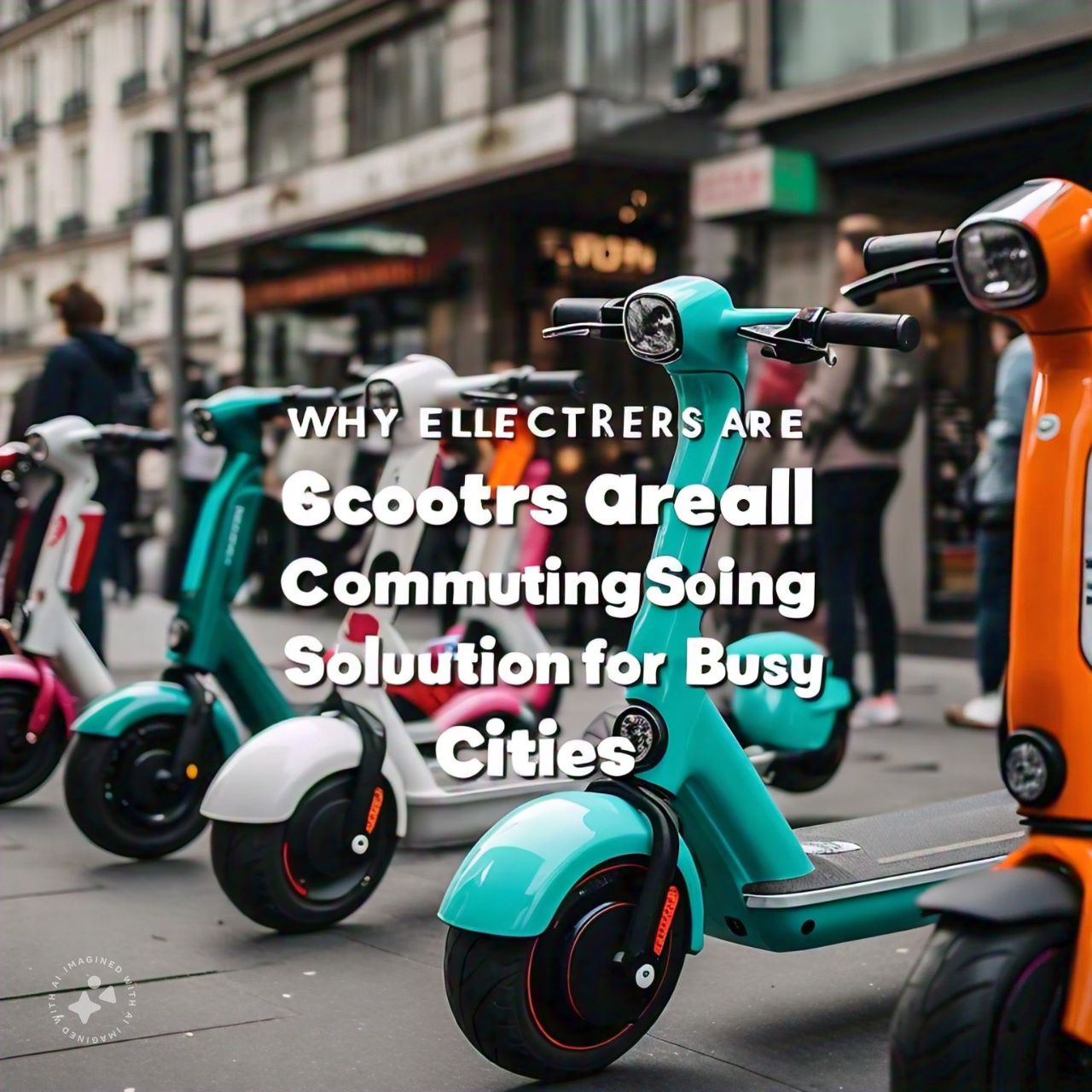Introduction:
Urban environments present unique challenges for daily commuting, where congestion, pollution, and the constant rush of people create a stressful atmosphere. Traditional transportation methods are increasingly proving inadequate in dealing with these issues. Vehicles clog up the streets, public transport often runs behind schedule, and walking long distances can be physically taxing. Against this backdrop, electric scooters emerge as a practical, efficient, and sustainable alternative. These lightweight, portable vehicles offer a convenient solution for navigating crowded city streets, reducing the reliance on cars and public transport. The adoption of electric scooters is transforming urban mobility, providing a new way to move through cities with ease and speed. Their rising popularity highlights their potential to redefine how people commute in bustling urban centers, making them an attractive option for those seeking a more efficient way to travel.
The appeal of electric scooters lies not only in their convenience but also in their ability to address some of the most pressing issues faced by modern cities. With growing concerns over environmental sustainability, the need for greener transportation options has never been greater. Electric scooters, powered by rechargeable batteries, produce zero emissions, offering a cleaner alternative to fossil fuel-dependent vehicles. This shift toward electric mobility is not just a trend; it’s a necessary evolution in how people think about transportation in cities. As urban populations continue to grow, the demand for efficient, eco-friendly, and affordable transportation solutions will only increase, positioning electric scooters as a key player in the future of urban commuting.
The Environmental Benefits of Electric Scooters:
“One of the most significant advantages of electric scooters is their positive impact on the environment. Unlike traditional vehicles that rely on gasoline or diesel, electric scooters run on rechargeable batteries, which do not emit harmful pollutants into the air. This reduction in emissions is crucial for improving air quality in cities, where pollution levels are often dangerously high. The widespread adoption of electric scooters can contribute to a significant decrease in the carbon footprint of urban areas, making cities cleaner and healthier places to live. The environmental benefits of electric scooters extend beyond just air quality. These vehicles also help reduce noise pollution, a common issue in densely populated cities. Unlike cars and motorcycles, which produce loud engine noises, electric scooters operate quietly, contributing to a more peaceful urban environment. This reduction in noise pollution can enhance the quality of life for city residents, making urban areas more livable and enjoyable.
The production and disposal of traditional vehicles also have a significant environmental impact, from the extraction of raw materials to the emission of greenhouse gases during manufacturing processes. In contrast, electric scooters have a smaller environmental footprint throughout their lifecycle. They require fewer resources to produce and, due to their electric nature, contribute less to environmental degradation over time. Additionally, the rise of shared electric scooter programs in cities allows for more efficient use of resources, as multiple people can use the same scooter, further reducing the overall environmental impact.” – Leo Baker, Chief Technology Officer at Vendorland
The Economic Advantages of Electric Scooters:
The cost-effectiveness of electric scooters is another factor that makes them an ideal commuting solution for busy cities. With the rising costs of fuel, vehicle maintenance, and public transportation, many city dwellers are looking for more affordable ways to get around. Electric scooters offer a cost-efficient alternative, with lower operating costs compared to traditional vehicles. Charging an electric scooter is significantly cheaper than filling up a car with gas, and the maintenance required for electric scooters is minimal. This affordability makes electric scooters accessible to a broader range of people, including those who may not have the financial means to own a car or use public transportation regularly.
In addition to the lower costs associated with operating electric scooters, these vehicles also have the potential to reduce the overall economic burden on cities. Traffic congestion is a significant issue in many urban areas, leading to lost productivity, increased fuel consumption, and higher levels of pollution. By encouraging the use of electric scooters, cities can alleviate traffic congestion, leading to more efficient transportation networks and a reduction in the economic costs associated with gridlock. Moreover, the rise of electric scooter-sharing programs has created new economic opportunities, from job creation in the scooter maintenance and management sectors to the development of new business models centered around shared mobility.
The Convenience and Flexibility of Electric Scooters:
The convenience of electric scooters is unmatched, especially in busy urban environments where time is of the essence. Unlike cars or public transport, electric scooters allow for quick, direct travel without the need to adhere to schedules or navigate through crowded stations. Their compact size and lightweight design make them easy to maneuver through traffic, enabling riders to avoid the delays associated with traditional commuting methods. This convenience is particularly beneficial during rush hours when traffic congestion can turn a short trip into a lengthy ordeal. With an electric scooter, commuting becomes faster, more predictable, and less stressful.
The flexibility of electric scooters also makes them an attractive option for city dwellers. These vehicles can be easily folded and carried into buildings, eliminating the need for parking spaces and reducing the risk of theft. This portability allows for seamless integration into multi-modal transportation systems, where riders can combine scooter travel with other forms of transit, such as buses or trains. For those living in areas with limited public transportation options, electric scooters provide a reliable and flexible solution, bridging the gap between different parts of the city. This flexibility is further enhanced by the availability of electric scooter-sharing programs, which allow users to pick up and drop off scooters at various locations throughout the city, providing a convenient and accessible transportation option for all.
The Safety Features and Technological Advancements of Electric Scooters:
Safety is a critical concern for any mode of transportation, and electric scooters are no exception. Modern electric scooters are equipped with a range of safety features designed to protect riders and pedestrians alike. These include bright LED lights for visibility, anti-lock braking systems, and durable tires that provide better grip on various surfaces. Additionally, many electric scooters are equipped with advanced technology such as GPS tracking and smartphone connectivity, allowing riders to monitor their speed, battery life, and other important metrics. These features contribute to a safer riding experience, reducing the risk of accidents and making electric scooters a reliable option for urban commuting.
Technological advancements in electric scooter design have also played a significant role in enhancing their safety and performance. The development of more efficient batteries has increased the range and power of electric scooters, allowing riders to travel longer distances without needing to recharge. Improvements in motor technology have resulted in smoother acceleration and better control, making electric scooters easier and safer to ride. As technology continues to evolve, electric scooters are likely to become even more advanced, with new features and capabilities that further enhance their safety and usability. These innovations position electric scooters as a forward-thinking solution to the challenges of urban commuting, offering a glimpse into the future of transportation in busy cities.
The Role of Electric Scooters in Shaping the Future of Urban Mobility:
“Electric scooters are not just a passing trend; they represent a fundamental shift in how people think about transportation in cities. As urban populations continue to grow and traditional transportation systems become increasingly strained, the need for alternative commuting solutions is more critical than ever. Electric scooters offer a viable solution to these challenges, providing a flexible, efficient, and environmentally friendly way to navigate busy city streets. Their widespread adoption is likely to have a lasting impact on urban mobility, reshaping the way cities are designed and how people move within them.
The integration of electric scooters into urban transportation networks is also driving broader changes in how cities approach mobility. Many cities are investing in infrastructure to support electric scooters, such as dedicated lanes and parking areas, reflecting their growing importance in the urban landscape. Additionally, the rise of shared electric scooter programs is promoting a shift toward shared mobility, where individuals have access to a range of transportation options without the need to own a vehicle. This shift is likely to accelerate in the coming years, as more cities recognize the benefits of electric scooters and invest in the infrastructure needed to support their use. In this way, electric scooters are not only transforming individual commuting experiences but also playing a crucial role in shaping the future of urban transportation.” – Holly Darani, the Content Head at UNAGI Scooters
Conclusion:
The advantages of electric scooters in urban environments are clear, making them an ideal commuting solution for busy cities. Their environmental benefits, cost-effectiveness, convenience, and safety features position them as a practical alternative to traditional transportation methods. As cities continue to grow and evolve, the demand for efficient, eco-friendly, and flexible transportation solutions will only increase, further solidifying the role of electric scooters in the future of urban mobility. The adoption of electric scooters represents a significant step forward in addressing the challenges of modern commuting, offering a cleaner, more efficient way to navigate the complexities of city life.



